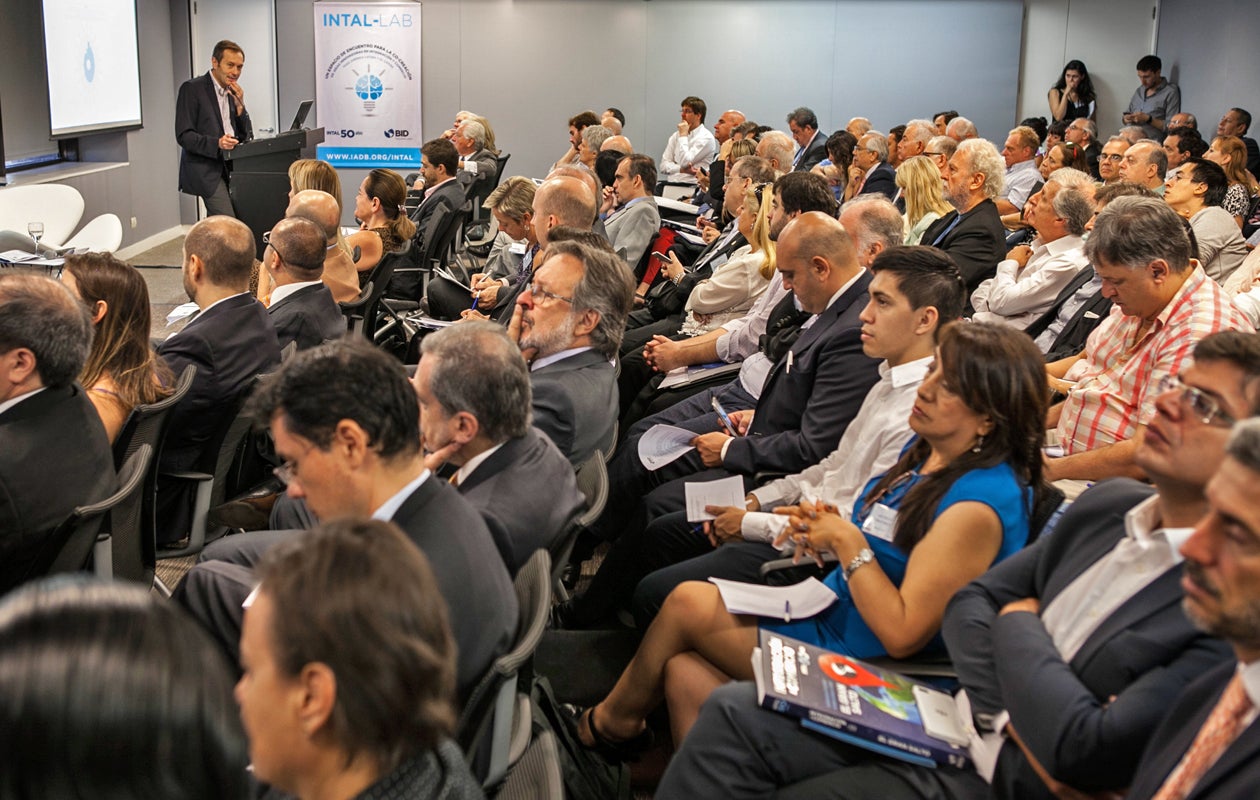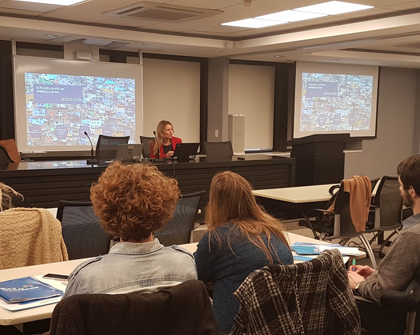What do Latin Americans think about regional and global integration? The Institute for the Integration of Latin America and the Caribbean (INTAL) and Latinobarómetro have already conducted over 20,000 exclusive surveys in 18 countries in the region. This new joint initiative will provide continuous measurements of people’s views on the issues that are most sensitive for public policy design: democracy, regional integration, living conditions, infrastructure, services, citizen security, and the environment, among others. The aim is to understand how Latin Americans feel about these topics.
On February 25, 2016, the preliminary results of the study were presented at the INTAL-Lab. As part of this initial exploratory process of connecting the two data sources, citizens’ perceptions were also compared with objective indicators for national economies, thus revealing correspondences and asymmetries between individuals’ subjective opinions and the region’s objective performance. This included exercises to “link up the tables”: that is, to connect the Latinobarómetro database with INTRADE, the IDB’s trade and integration database.
Government officials and representatives from the executive and legislative branches of nine Latin American countries took part in the summer colloquium entitled “The Voice of Latin Americans, a Regional Public Good.”
The event was opened by INTAL director Gustavo Beliz, who pointed out that “there are very few conferences at the regional and global levels that do not quote Latinobarómetro results when discussing Latin America.”
Latinobarómetro director Marta Lagos (link in Spanish) emphasized that “governments tend to guide their decisions on the basis of objective data, but this is just one way of trying to rationalize reality and it may not make much sense to citizens.” In fact, Lagos argued, it is people’s subjective opinions that end up determining their behavior. “We have now started linking up the tables: the table that describes what is happening in our society, and the table that contains what we think is happening. The so-called objective and subjective aspects,” she explained.
“There is a lack of statistics on Latin America, but there is an ever greater lack of theories that explain its development. Even after a decade of a virtuous democratic growth cycle, we continue to be the most unequal region in the world, and the most distrustful one. This implies that there are two characteristics that define us and set us apart: the fact that most people aspire to equality and distrust political development,” Ms Lago summarized, stressing that the aim of Latinobarómetro’s alliance with INTAL is to build added value onto the knowledge of our societies.
This Is Us
Gustavo Beliz (link in Spanish) and IDB/INTAL consultant Santiago Chelala presented the results of “This Is Us. What do Latin Americas and Caribbeans Think About Regional Integration? (link in Spanish)”, the first study of the region to connect objective integration and trade data with the results of opinion polls.[1]
With regard to integration into the world, Beliz stressed that:
- One in four Latin Americans believes that global integration is a priority issue for development. In some countries, such as Uruguay, that figure is as high as four in every ten people.
- The development issue around which there is most consensus is environmental protection: 43% of Latin Americans consider it a priority.
- Socioeconomic status is a conditioning factor for people’s support for global integration, which is higher among young people and those who believe themselves to have higher incomes.
- Citizens of countries with the highest average most-favored nation (MFN) tariffs—that is, non-preferential tariffs—were more likely to think that global integration should be a priority issue.
The countries with the lowest coefficients for economic openness (exports+imports/GDP) also believe that global integration is a priority for development.
Figure 1. Key Development Issues.
Question: Which of the following topics are the most important for your country’s development: the environment, infrastructure, institutions, global integration, social policies.* (in % of total responses.)
With specific regard to regional integration, the report notes the following aspects:
- Some 44% of Latin Americans would agree or strongly agree on the need to include commitments relating to care for the environment in regional integration agreements, even if this implies paying approximately 20% more for products.
- Some 69% of Latin Americans agree or strongly agree that their country should be able to buy goods and services from any other country in the region and that any other country should be able to sell goods and services to their country.
- The worse the quality of local infrastructure, the greater the population’s willingness to pay for better infrastructure. The higher citizens’ educational levels are, the greater this predisposition is.
- Some 66% of the region’s population believe that regional integration has a positive impact on access to technology, 58% believe it to have a positive impact on exports, 55% on investments, 52% on employment, and 48% on their own personal situation.
- In contrast, 45% believe that regional integration had a negative impact on citizen security.
- Some 41% of citizens agree or strongly agree on paying 20% more for products if this implies protection for the rights of both foreign and domestic workers. The inclination to pay is greater in countries with more equal income distribution.
Special guest and Eurobarometer expert Marita Carballo (link in Spanish) traced the origins of these public opinion polls in Europe back to 1973, and underlined how governments at the time needed to understand what Europeans thought about the integration process that had begun in the 1950s, and also to monitor the same problems across all countries in the region. At present, Globalbarometer, an international federation of barometers includes data from around 90 countries in the world. Ms Carballo also stressed the importance of finding common patterns in Latin American identity as a key factor in regional integration.
For their part, IDB specialists Paolo Giordano and Alejandro Ramos Martínez (link in Spanish) presented the INTRADE and DataINTAL portals, which are the source for the objective indicators used in the “This Is Us” report, which will mainly be used in conjunction with the results of the 2016 Latinobarómetro survey.
Innovation, Inclusion, and Development
Other IDB experts presented the state of the art with regard to indicators of innovation, inclusion, and social development, with the intention that these would serve as triggers for the production of the new 2016 questionnaire. Pablo Valenti, a specialist from the IDB’s Institutions for Development Sector (IFD), highlighted the potential of social networks, given that Latin America is one of the global regions that most uses these. The challenge lies in the gap between what citizens ask of their governments (mainly security and transport), and what governments tell voters their priorities are (culture, education) [Julieta: ¿estamos interpretando bien que “lo que los gobiernos comunican a sus representados” se refiere a lo que comunican como prioritario?].
In the field of science and technology, lead specialist Gustavo Crespi noted that in addition to traditional indicators (such as patents, R&D expenditure, or company surveys), it is important to obtain public opinion surveys. This allows us to understand the value that citizens place on science and technology in society from different perspectives. For example, the way in which individuals appropriate innovations (such as consuming genetically modified foods or using health-care products) may vary depending on how they assess the risks and benefits of these.
Economic research specialist Fabiana Machado stressed that the advantage of opinion polls [Julieta: falta la “de” después de encuestas], unlike objective data, is that they can adapt data to our needs. However, in order to take advantage of this data, we need to be clear about exactly what we are trying to measure and, above all, know how to obtain this information from those we are polling.
For his part, Social Sector specialist [Julieta: dice “especialistas” (plural) en vez de “especialista”] Marcos Robles highlighted the IDB’s work on the harmonization and systematization of a wide range of social indicators across the region so as to make them comparable across countries. This undertaking is reflected in the Sociómetro-BID [Julieta: en el sitio del BID en inglés no está traducido el nombre de este dataset. ¿Está bien que lo dejemos así?], which will soon include the results of two projects related to the labor market and education.
Finally, a specialist from the IDB’s Office of Strategic Planning and Development Effectiveness (SPD), Armando Justo, outlined some of the results of the IDB’s External Feedback System (EFS), a series of 10 surveys carried out between 2012 and 2014 and involving more than 4,000 people in the region, with the aim of optimizing institutional projects within the government, the private sector, academia, and civil society.
Government Experiences
On the second day, government officials and representatives from regional legislative bodies shared different experiences relating to public surveys and the monitoring of indicators in strategic areas such as citizen security, democratic transparency, and regional integration. This led to a constructive open discussion among all those taking part in the event, from which an interesting finding emerged: there is convergence around the demands for information for the adoption of public policies.
With specific regard to integration, Mijail Quipse Sandival, Deputy Director of Integration at Peru’s Ministry of Foreign Affairs, said that his country uses some objective indicators to analyze existing integration processes, but he thought that understanding how much citizens themselves know about these is also necessary. He stressed the importance of knowing what people understand by “integration.”
The Director of Strategic Planning at Chile’s Ministry of Foreign Affairs, María del Carmen Domínguez, explained that there may be a negative correlation in the region between citizen support for integration and signed agreements, a situation that calls for greater interaction between governments and civil society.
In turn, the Director of Ecuador’s National Secretariat of Planning and Development, Patricia Martínez, raised the idea of dividing the questionnaire into “soft” integration questions, in relation to the temporary movement of people and culture, and “hard” integration questions, focusing on what individuals identify as the strategic sectors that need to be protected from regional competition. At this point, Marta Lagos emphasized that “Latin Americans agree with free trade, but not with free movement, because they identify this with unemployment and lack of safety.”
With regard to citizen security, one of the issues of most concern to Latin Americans (even in relation to integration), Luiza Hermeto, Adviser to the Special Organization for Crime Prevention in the state of Minas Gerais, Brazil, presented three systematic surveys undertaken at the state level. The premise for this research is that citizen security is increasingly a central component of welfare in contemporary societies—for example, it alters behavior habits and the physical structure of homes. Among other indicators, the State of Minas Gerais measures how far citizens trust their institutions and environment, how satisfied they are with the responses of defense agencies, and whether they are afraid of being the victim of a crime.
Javier Donnangelo, Director of the Observatory on Violence and Crime at Uruguay’s Ministry of the Interior, wondered how far fear and a feeling of lack of safety were associated with objective crime rates. Uruguay currently has an extensive series of objective crime indicators, but he felt it would be necessary to include a regional measurement that links objective crime rates with specific social factors among the population, such as levels of drug and alcohol consumption, perceptions of social inequality and gender roles, or ease of access to firearms.
Building on this point, the Director General of the Cabinet of Paraguay’s Minister of the Interior, Humberto Insfrán Miranda, emphasized the importance of making this sort of information public. In fact, he wondered whether announcing that emergency buttons are being installed on streets increases citizens’ feeling of safety or, in contrast, makes them feel that they are living in an increasingly unsafe context.
On this issue, Marta Lagos explained that over the last decade people’s perceptions of lack of safety have increased, while crime rates have remained relatively stable. “There has always been crime in Latin America, but 20 years ago, the main problems were economic ones.”
Transparency policies were another major topic of discussion. José Dantos Filho, Higher Education Coordinator of the Brazilian Legislative Institute, stressed that given the legislative developments in Brazil regarding public spending and access to information, the country’s supervisory bodies have created a series of indicators to assess the transparency of the different branches of government. In the case of the executive branch, internet portals are measured in terms of their content, how far back the information goes and whether it is up-to-date, and ease of navigation. The legislative branch, in turn, is currently developing a transparency index that will include legislative acts that are not directly reflected in the legislation itself.
With regard to transparency, the Director of Planning and Development of the Dominican Republic’s Central Electoral Board (JCE), Pavel Rivas Goris, commented that the way elections in his country are organized relies heavily on technology, which makes the voting process highly legitimate.
Gustavo Meixuerio, Counselor President of the Electoral and Citizen Participation Institute of the State of Oaxaca, Mexico, said that it would be of interest to know how Latin Americans perceive matters of electoral fraud, ethnic diversity, and gender differences in the region. The issues at stake in this regard are people’s perceptions of discrimination and representation within the political system. Francisco Sales Heredia, Director of the Center for Social and Public Opinion Studies of Mexico’s Chamber of Deputies, shared the results of national public opinion polls that had caused surprise due to the large proportion of the population that was not aware of the concept of social rights, while another substantial share associated “being a citizen” more with responsibilities, such as paying taxes, than with rights.
Those participating in the event agreed that cross-referencing perceptions and economic data allows us to better understand the demands for integration (in the broad sense of the term, which includes trade-related, physical, and social aspects), and thus can contribute to the design of public policies that seek to satisfy these. This comparison of data from both sides of the spectrum—tangible and intangible—is a new aspect of comparative studies on this issue.
The concordance between objective trends and public perceptions allows a dual course of action to be plotted. This would include, on the one hand, considering subjective needs when establishing the priorities and objectives of integration strategies and, on the other, conclusively assessing whether decisions that have already been taken have actually had the desired impact on citizens’ perceptions of daily life.

[1] The 2015 Latinobarómetro survey included five specific questions about integration.





